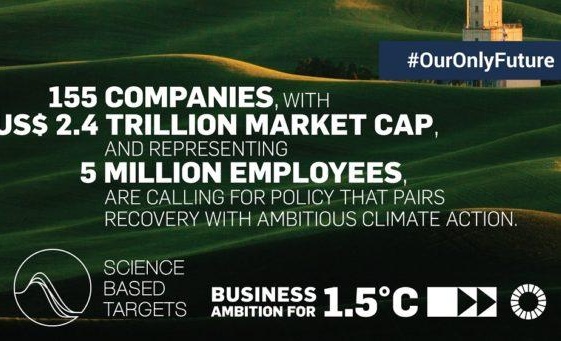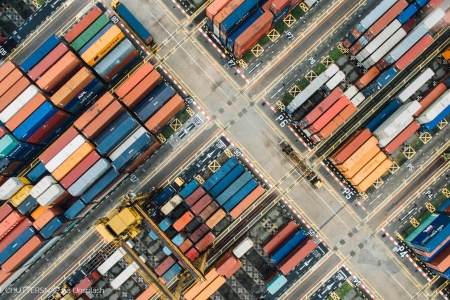
Over 150 global corporations urge world leaders for net-zero recovery from COVID-19
9th Jul 2020
155 companies have signed a statement urging governments around the world to align their COVID-19 economic aid and recovery efforts with the latest climate science.
The following is a joint press release by the Science Based Targets initiative, the UN Global Compact, and the We Mean Business coalition
- Carlsberg Group, EDF, Electrolux, Enel, Iberdrola, Saint-Gobain, Schneider Electric among 155 companies urging governments to align socio-economic recovery with climate science
- In largest ever UN-backed CEO-led climate advocacy effort, major multinationals reaffirm their own science-based commitments to achieving zero carbon economy and call on governments to match their ambition
19 May 2020, LONDON and NEW YORK
155 companies — with a combined market capitalization of over US$ 2.4 trillion and representing over 5 million employees — have signed a statement urging governments around the world to align their COVID-19 economic aid and recovery efforts with the latest climate science.
As debates on recovery packages around the world ramp up in the coming weeks, the companies, which are all part of the Science Based Targets initiative , are calling for policies that will build resilience against future shocks by supporting efforts to hold global temperature rise to within 1.5°C above pre-industrial levels, in line with reaching net-zero emissions well before 2050.
The signatories span 34 sectors and have headquarters in 33 countries. They include: Abdi Ibrahim Pharmaceuticals, ACCIONA, Accor, Adobe, Agder Energi, Arabesque, Arc’teryx Equipment, AstraZeneca, Auchan Retail Portugal, Bayer, Beiersdorf, BIAL, Bonava, Burberry, Capgemini, Cargotec, Carlsberg Group, Cellnex, CEWE Stiftung & Co. KGaA, City Developments Limited, CMA CGM, Coca-Cola European Partners, Colgate Palmolive Company, Corbion, Cranswick, Dalberg Advisors, Dalmia Cement (Bharat) Limited, Danfoss Group, Diageo, Diam Group, dormakaba, Dutch-Bangla Pack, EcoVadis, EDF Group, EDP Energias de Portugal, Electrolux, En+ Group, Enel, ERM, Europcar Mobility Group, Ferrocarrils de la Generalitat de Catalunya, Firmenich, Gleeds, Glovo, Grundfos Holding, Grupo Red Eléctrica, GSMA, H. Lundbeck, H&M Group, Henkel, Hewlett Packard Enterprise, Husqvarna Group, HP Inc., Iberdrola, ICA Gruppen, Inditex, Ingka Holding, Inter IKEA Group, Intuit, JLL, Kearney, Kelani Valley Plantations, Kuehne + Nagel Management, LafargeHolcim, Legrand, Lojas Renner, Maeda Corporation, Magyar Telekom, Mars, Marshalls, Marui Group, Media 6, Movida Participações, MP Pension, Natura & Co., Nestlé, Nomad Foods, Novartis, Novo Nordisk, NR Instant Produce Public Company, O. T. Sports Manufacture, Orange, Orbia Advance, Orkla, Ørsted, Pearson, PensionDanmark, Pernod Ricard, PVH Corp., Refinitiv, Ronald Lu & Partners, Royal DSM, RSE (Ross-shire Engineering), Safaricom, Saint-Gobain, Salesforce.com inc., Sanofi, Scania, Scapa Inter, Schneider Electric, Schüco International, SIG Combibloc, Signify, Sky, SkyPower Global, Sofidel, Sonae Sierra, Sopra Steria Group, Stora Enso Oyj, SUEZ, Symrise, Syngenta Group, Takasago International Corporation, Talawakelle Tea Estates, Tate & Lyle, Tech Mahindra, Telefonica, The Co-op, The Lux Collective, TMG Automotive, Unilever, Vattenfall, Vaude Sport, Verbund, Vestas Wind Systems, Vodafone Group, Wipro, Yarra Valley Water, YKK Corporation, and Zurich Insurance Group, amongst others.
The statement comes as governments around the world are preparing trillions of dollars worth of stimulus packages to help economies recover from the impacts of the coronavirus pandemic, and as they prepare to submit enhanced national climate plans under the Paris Agreement. In the coming weeks, several major economies will take key decisions in their recovery efforts, including the European Union Recovery Plan, new stimulus packages from the United States of America and India, and the G7 Heads of State summit in June.
The 155 companies have already set, or committed to set, science-based emissions reduction targets. By signing the statement, they are reaffirming that their own decisions and actions remain grounded in science, while calling on governments to “prioritize a faster and fairer transition from a grey to a green economy.” Policy and spending that incorporates climate targets will reduce vulnerability to future shocks and disasters, create good jobs, reduce emissions and ensure clean air, according to a study from Oxford University .
“Saving lives and livelihoods, and building a prosperous, inclusive and sustainable future, are at the heart of our efforts to recover from COVID-19,” said UN Secretary-General António Guterres. “We can beat the virus, address climate change and create new jobs through actions that move us from the grey to green economy. Many companies are showing us that it is indeed possible and profitable, to adopt sustainable, emission-reducing plans even during difficult times like this. I warmly welcome the ambitious, science-based actions we are seeing from leading companies who are demonstrating to policy-makers that green growth remains the best growth strategy.”
Ignacio Galán, Chairman & CEO, Iberdrola, said: “The world must be united to tackle the current health crisis. And, as we emerge from this crisis, we must focus economic recovery on activities aligned with key priorities, such as the fight against climate change, and reactivating economic activity and employment quickly and sustainably. Companies like ours remain committed to investing billions in clean energy, creating jobs and long-term economic and environmental benefits. Pursuing environmental sustainability will be essential for long-term economic recovery.”
The business voices are convened by the Science Based Targets initiative (SBTi) and its Business Ambition for 1.5°C campaign partners, the UN Global Compact and the We Mean Business coalition. The SBTi, which is a collaboration between CDP, the UN Global Compact, World Resources Institute and WWF, independently assesses and validates corporate climate targets against the latest climate science.
“Governments have a critical role to play by aligning policies and recovery plans with the latest climate science, but they cannot drive a systemic socio-economic transformation alone. To address the interconnected crises we face, we must work together as an international community to deliver on the Sustainable Development Goals and the Paris Agreement,” said Lila Karbassi, Chief of Programmes at the UN Global Compact, and Science Based Targets initiative Board Member. “As the largest ever UN-backed CEO-led climate advocacy effort, these companies are leading the way in driving ambitious science-based action and advocacy to help reduce vulnerability to future shocks and disasters.”
Paul Simpson, CEO of CDP, one of the SBTi partners, said: “The coronavirus outbreak is a stark reminder of the fragility of our current economic system. It also reminds us that science must be our collective guide on the path to a more resilient economy. Setting and working towards science-based targets is the best way for companies and governments alike to protect against future climate-related business and economic disruptions.”
Maria Mendiluce, CEO of the We Mean Business coalition, said: “Governments can be reassured that businesses are implementing science-based targets to get us on a 1.5°C trajectory. They are calling for recovery policies that will boost the economy and build resilience. A net zero aligned recovery will enable companies to invest and innovate at the pace and scale necessary to build back better, creating decent jobs, protecting health, reducing emissions and increasing resilience in the future.”
“It is imperative that we not only restart the world economy – but also reset it. It would be a tragedy if after spending $10-20 trillion of public money we simply rebuild the same unequal, vulnerable and high carbon economy we had before” said Dr. Andrew Steer, President and CEO of World Resources Institute and SBTi Board member. “We applaud the leaders of these 155 companies, who are not only committed to resetting their own companies but are also demanding that the world’s governments act in the light of the best science and best economics which shows that climate-smart policies will create more jobs and stimulate resilient, inclusive economic growth.”
The Recover Better statement, including a full list of company signatories, can be viewed here.
It is is available in the following languages:
For more information or interviews, please contact:
- Sophie Grant, ESG Communications
Sophie@esgcomms.com | +44 (0)7817 371323
- Sarah Savage, Science Based Targets initiative
- Matthew Hunter, UN Global Compact
Signatures
- Jean-Bernard Lévy, CEO, EDF
“We need to unite all forces to recover and develop a better model. Building for more than 70 years on the values of public service, EDF Group, through its 165,000 employees, is committed to a fair, sustainable and innovative net zero future.”
- Georg Kell, Chairman, Arabesque Partners
“The right choice now is to revive economic activities by investing in decarbonization and future fit technologies”
“Going back to business as usual would be short sighted and self destructive. The right choice now is to invest in resilient and future fit activities”
“Policy makers now have a historic choice to make: give in to short term impulses and revive markets of the past and thereby fuel the next crisis or think ahead and build a more resilient, healthier future based on zero emissions.”
- Kim Fausing, President & CEO, Danfoss Group
“The economic recovery after COVID-19 must be green and sustainable. For societies all over the world to retain and create jobs, we need to bring investments forward, focusing on emissions reductions through energy efficiency in buildings and manufacturing industry and electrification of transport.”
- Mark Schneider, CEO, Nestlé
“Let’s work together to create a more sustainable and resilient world. We will play our part and are committed to net-zero greenhouse gas emissions by 2050.”
- Annica Bresky, President and CEO, Stora Enso
“Stora Enso remains committed to our ambitious emissions reduction targets in these unpredictable times. As the global economy recovers, the world has an opportunity to speed up the necessary transition away from fossil energy and material dependency. Here, our renewable materials make a difference. They are a key solution to combating global warming as they store carbon and replace fossil-based materials. We continue to play our part to achieve net zero emissions.”
- Beatriz Corredor Sierra, Chairwoman of the Board of Directors, Grupo Red Eléctrica
“Many measures are going to be deployed to reactivate the economy and we have an historical opportunity to choose those that are aligned with the climate agenda and with the SDGs. The climate crisis is still in force and the urgency to act is real. Measures to fight and adapt climate change are closely linked to pollution reduction and health protection. At this moment we are more aware, if possible, of the relevance of working on these aspects. The measures aimed at decarbonizing the economy: electrification of the society, integration of renewables, energy efficiency … carry plenty of opportunities for job creation and economic development, and they are indeed sustainable in the long term.”
- Ignacio Galán, Chairman & CEO, Iberdrola
“The world must be united to tackle the current health crisis. And, as we emerge from this crisis, we must focus economic recovery on activities aligned with key priorities, such as the fight against climate change, and reactivating economic activity and employment quickly and sustainably. Companies like ours remain committed to investing billions in clean energy, creating jobs and long-term economic and environmental benefits. Pursuing environmental sustainability will be essential for long-term economic recovery.”
- Jon Hoerauf, President, Arc’teryx Equipment
“Arc’teryx believes that mid- and long term economic success requires bold action on climate change – both by companies and by governments. We are proud to have committed Arc’teryx to science-based climate targets. At this time of crisis, we call on governments at all levels to make smart and aggressive climate action part of their recovery plans and of the public investments that can reshape and rebuild an economy to deliver long term prosperity.”
- Henrik Henriksson, CEO, Scania CV
“It is of utmost importance that all measures taken by governments to rebuild our economies after the pandemic put sustainability as a center piece. We cannot afford to lose any more time in the combat against climate change. At Scania we are convinced that we can decarbonize heavy transport within the timeline stipulated by the Paris Accord on Climate and we are determined to do our part.”
- Francesco Starace, CEO and General Manager, Enel S.p.A
“A proper recovery will contribute to restart the economy and protect people and jobs, but at the same time will accelerate changes that we’ve realized are needed more than ever. The private sector has a major role to play in it. The future of companies and their contribution to reduce climate change are two things that go together, so there is no other way than to align all our efforts for recovery with SDG 13 (Action to combat climate change).”
- Edwin Macharia, Global Managing Partner, Dalberg
“COVID-19 has shown the world how devastating a global crisis can be to both human lives and economies. The climate crisis will be the defining challenge for humanity, and without action it promises even greater disruption. And like COVID-19, climate change does not respect borders and nationalities.
At Dalberg, we are especially concerned about the impact it will have on less resourced communities. Those who are least responsible for creating the problem will be the hardest hit. We must create inclusive, low carbon and sustainable systems in the recovery from COVID-19 in order to transition to a future climate-resilient economy.”
- Alexandre Ricard, CEO, Pernod Ricard
“The COVID-19 crisis and its impact will be felt for generations to come. The global community has shown great strength and resilience, coming together as we all tackle this collective challenge. Pernod Ricard has a strong and proud history of sustainability and responsibility and we fully support that this recovery must be based on sustainable principles for a greener and more inclusive tomorrow. All our products come from the earth and are deeply rooted in their terroirs – Jameson in Ireland, Martell in France, Absolut in Sweden. Our collective future depends on the commitment of everyone running their businesses in an environmentally sustainable way, as we run ours.”
- Helena Helmersson, CEO, H&M Group
“We have the chance to truly reconstruct a better future, and while doing it, we need to ensure that the recovery measures taken today are not at the cost of our planet. It is now more important than ever that companies and governments show leadership standing by their commitments in climate action, and that we take responsibility together.”
- Olivier Rigaud, CEO, Corbion
“The worldwide response to COVID-19 demonstrates how quickly we can change our behaviors and underlines the need to respect our planet’s natural boundaries. Imagine what is possible if we turned our collective attention towards climate action and work together on the same scale to preserve our planet. Corbion is leading the way with our ambitious science-based targets to reduce our carbon emissions and we encourage others to join.”
- Carsten Knobel, CEO, Henkel
“Now, we need to invest in innovation, scale up the solutions we already have and work with our partners along the value chain towards climate-neutrality. To achieve that, we have set ourselves ambitious, science-based targets.”
- Jonas Samuelson, President and CEO, Electrolux
“The corona pandemic has forced business into unprecedented territory but we believe addressing climate change is as urgent as ever. We will continue to strive for reduced emissions from our operations and products as we provide appliances that are essential for better and more sustainable living across the world.”
- Daniel Martínez-Valle, CEO, Orbia
“COVID-19, first and foremost, is a global humanitarian crisis. However, it has also illuminated that needed greenhouse gas reductions, although challenging, are within our reach. In fact, for 2020, the projected year over year reduction is 8%. Without strong policy and collective action to follow-up, there is risk of a rebound. Governments should act now, establish a common framework and set of rules, ensuring the right economic incentives are developed to drive action towards a low carbon future. As the economy re opens, we have the opportunity to decouple growth from carbon emissions, re-invent supply chains, re-imagine the way we work and galvanize our global community to address some of the world’s biggest challenges. At Orbia, climate action is a part of our purpose and our plans address sustainable progress. Immediate and collective action will ensure a future for humankind.”
- Jan Jenisch, CEO, LafargeHolcim
“We are proud to join Uniting Business and Governments to Recover Better as part of the Science Based Targets initiative (SBTi). LafargeHolcim is leading the way in low-carbon construction. From our operations to our products and solutions we are committed to enabling sustainable living worldwide.”
- Jaan Ivar Semilitsch, CEO & President, Orkla
“The corona crisis puts an enormous burden on society, and there is a need for governments and business to come together in rebuilding the economy. In doing so, we should look ahead, and strive for new growth which is inclusive and which protects the planet. Through dialogue and joint efforts we should make the transition into low carbon production and contribute to a sustainable development.”
- Paul Hudson, CEO, SANOFI
“In the face of the COVID-19 crisis, academia, scientists and industry have moved to look for a solution at an incredible pace. We now have to apply the same sense of urgency to other pressing but less apparent threats, such as climate change. Crises do not just neatly follow one after the other. They add up.”
- Damian Gammell, CEO, Coca-Cola European Partners
“Climate change is the world’s most urgent environmental challenge, and by signing the statement Uniting Business and Governments to Recover Better, I would like to see leaders from both come together to achieve long-lasting, transformative science-based climate solutions that support a sustainable recovery from the impact of COVID-19.
We have put sustainability at the very heart of the way we do business at Coca-Cola European Partners, and we have taken significant steps to reduce carbon emissions and help our climate. However, we know there is much more we can do, and we will continue to collaborate with our partners, stakeholders and communities to support the recovery process and harness our scale to deliver bold action on climate issues.”
- Peter Smink, CEO, Vattenfall
“The world has been struck by an unexpected pandemic and the likelihood of an economic recession is evident, unless we and policy makers take decisive action now. Vattenfall is committed to enable fossil-free living within one generation and we are convinced that this is a critical moment, where political and financial leaders can address the corona crisis and the climate crisis at the same time, by directing economic stimulus packages to investments in the energy transition, towards carbon neutrality by 2050 in Europe. This will secure sustainable economic growth and prosperity for all in the long run.”
- António Mexia, CEO, EDP – ENERGIAS DE PORTUGAL SA
“This is a unique opportunity to redesign the future. It is time to ensure that we recover better, that we rebuild an economy and a society that are more resilient, more sustainable and more inclusive. The energy transition towards a low carbon economy is undoubtedly one of the imperatives of this recovery and we are ready to take the lead.“
- Alex Liu, Managing Partner and Chairman of the Board, Kearney
“This is a moment of truth and opportunity: while we all face continuing global uncertainty, we should pivot towards the positive, pushing for disruptive approaches and further transformation towards a sustainable future. We are fully committed to working with our clients, governments and other stakeholders to build an inclusive and resilient green economy.”
- Shantanu Narayen, president and CEO, Adobe
“We have a unique opportunity to make climate action a central part of rebuilding the global economy, paving the way for a zero carbon economy and a more sustainable future. We’re proud to join over 150 peers in bringing businesses and governments together to advocate for ambitious climate action through strong Science Based Targets.”
- Kerry Adler, President and Chief Executive Officer, SkyPower
“Experience is the quintessential foundation of knowledge. Maybe not today, but in the near future we will have a golden opportunity to reset our compass and unify efforts towards a more sustainability focused future. A future, that will help breathe new life into the tattered economies in a direction where humanity and our planet are put first to ensure a brighter future for generations to come”.
- MANNY CHIRICO, CHAIRMAN AND CEO, PVH CORP.:
“At PVH, we are steadfast in pushing forward efforts to reduce greenhouse gas emissions and curb the negative effects of climate change. As we navigate the human and business impacts of this global health crisis, we have a responsibility – and opportunity – to ensure that recovery efforts include climate-smart policies that align with the latest science. With likeminded partners, we can prioritize climate solutions and work together to build a more resilient, sustainable future.”
- Grant Reid, CEO, Mars
“As Mars works to respond to the COVID-19 pandemic, we remain 100% committed to accelerating climate action and doing business in a way that positively impacts people and our planet. It is critically important that investments in recovery keep in mind the clean and resilient world we want tomorrow. We applaud government efforts to restore public health and economic stability, and we call on leaders to invest in a low-carbon, climate-resilient future as we rebuild.
Latest News
View News


